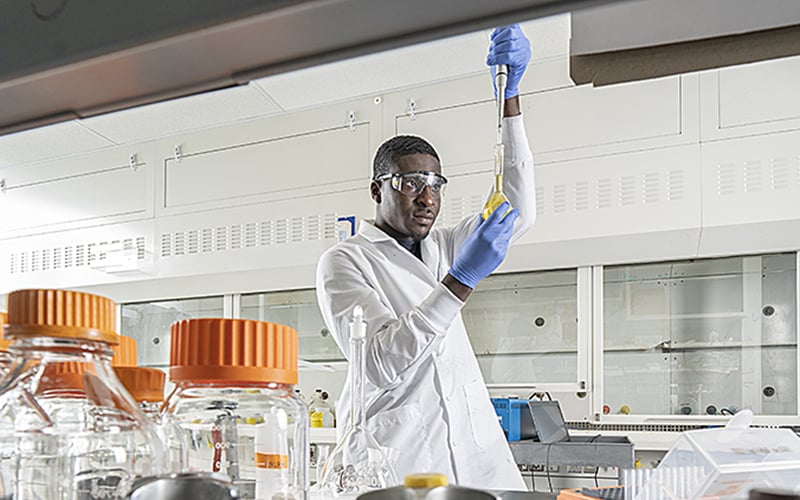Catalysis and Reaction

Understanding chemical reactions, developing better catalysts, and engineering reacting systems is a core component of chemical engineering. Research at Michigan in this increasingly significant area includes biomass conversion to fuels and chemicals, electrochemical reactions, plasma chemistry, petroleum production, biochemical engineering, environmental catalysis, fuel cells, CO2 capture and conversion. We employ computational, experimental and modeling approaches, often in concert, to solve pressing societal problems.
Bryan Goldsmith
Catalysis research in Professor Goldsmith’s group is focused on applying first-principles modeling (e.g., density-functional theory and molecular dynamics) and predictive theories to gain a deeper understanding of heterogeneous and homogeneous catalytic processes for natural gas conversion, pollution reduction, and energy generation. Some systems of interest include dispersed metal ions on amorphous supports, metallic clusters supported on metal oxides, and homogeneous organometallic catalysts for a variety of important reactions.
Mark Kushner
Professor Mark Kushner and his group computationally investigate the fundamental transport and kinetic properties of low temperature plasmas (partially ionized gases), plasma chemistry and plasma surface interactions and their application to society benefiting technologies. Current projects include plasma fabrication of advanced materials for nano-electronics, plasma medicine (use of plasmas for human healthcare), macro- and micro-plasmas as photonic sources, plasmas in liquids, plasma treatment of porous polymeric membranes, and plasma aided combustion for energy efficient transport systems.
Computational Plasma Science and Engineering Group
Rebecca Lindsey
Professor Lindsey’s group develops advanced simulation tools to establish a fundamental understanding of how chemistry mediates material behavior in extreme temperature/pressure environments and in complex systems. Her group leverages this new knowledge for material discovery and design, and to inform development of next-generation materials synthesis and manufacturing methods. Her group specializes in condensed phase simulation spanning quantum mechanical to coarse-grained scales, and artificial intelligence (e.g., machine learning) for efficient simulation and data-driven prediction.
Suljo Linic
The central objective of Professor Suljo Linic’s lab is the development of predictive theories of surface chemistry related to heterogeneous catalysis, electrocatalysis and photocatalysis. Lab members are currently working on a number of projects that aim to address various issues in the fields of energy and environment, functional nanomaterials, industrially-important reactions and fundamental heterogeneous catalysis.
Eranda Nikolla
Professor Nikolla and her group focus on studying issues related to heterogeneous catalysis and electrocatalysis for energy and chemical conversion/storage. Current research projects involve electrocatalysis in alkaline and acid media for low temperature fuel cells and electrolyzers, H2O and CO2 electrolysis using solid oxide electrolysis cells, energy storage in alkaline metal air batteries, hydrodeoxygenation of biomass-derived feedstock, heterogeneous catalytic pathways for recycling of plastic waste, thermal catalytic reduction of CO2 to chemicals/fuels, heterogeneous catalysis for emission control.
Nirala Singh
Catalysis research in the Singh Lab focuses on understanding heterogeneous catalysis and electrocatalysis through experimental rate measurements, spectroscopy and adsorption measurements. By looking at how catalyst surfaces influence rates and selectivities, we aim to understand and improve catalysts used for energy storage, fuel production from biomass waste, and waste remediation such as nitrate reduction.
Singh Group
Fei Wen
In the development of biofuels, Professor Fei Wen and her team rely on enzymatic catalysis to degrade biomass to sugars, which can be fermented.
Fei Wen – Protein Assembly Engineering Research Group
Robert Ziff
Professor Robert Ziff and his group have developed a kinetic Monte Carlo technique that allows reaction dynamics to be studied efficiently, including the kinetic phase transitions that occur in such systems. Ziff and his colleagues apply this to the reactions that take place on an automotive catalytic converter. The group also uses percolation models to study such phenomena as flow through porous media, conductivity of composites such as nano-tubules, polymer gelation and growth of the giant component in networked systems.